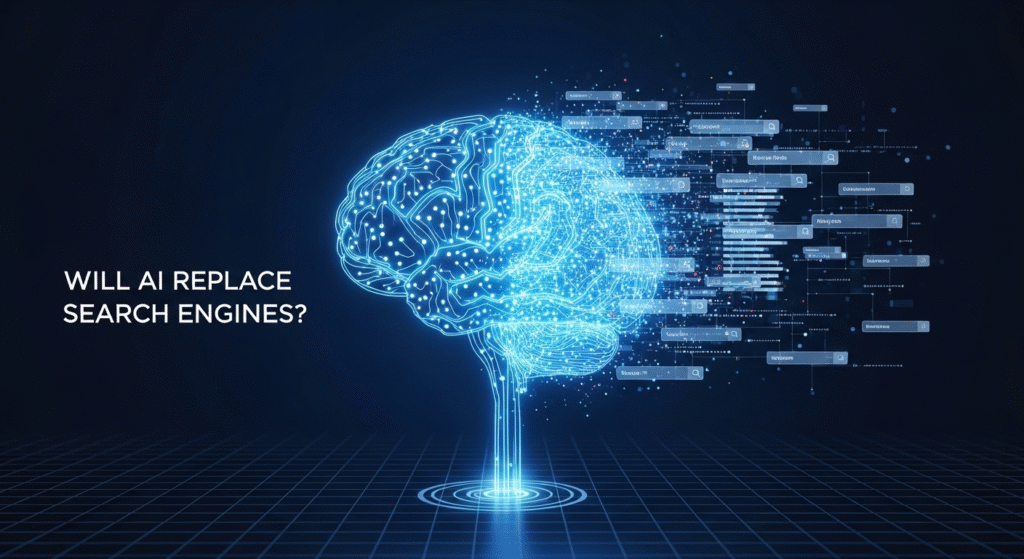
Ever pondered whether ChatGPT, Perplexity, or Gemini might overtake Google? With AI tools providing instant answers, some think search engines are on the brink of extinction. However, will AI truly replace search engines, or will it transform our search methods permanently?
Will AI Replace Search Engines or Transform Them?
Here’s the clear answer:
AI won’t completely replace search engines, but it will become an integral part of them, revolutionizing the way we find, consume, and interact with online information.
In this piece, Serpexo delves into the distinctions between AI and search engines, explores the evolution of search technology, and offers guidance on how to adjust your SEO approach for the AI-driven future.
Can AI Take the Place of Search Engines?
AI will not fully replace search engines; however, it will dramatically change their functionality. Search engines like Google and Bing are not being phased out but are advancing by integrating generative AI technologies. While AI-powered tools effectively offer summaries, synthesize data, and provide quick responses to users’ questions, people still turn to search engines for authenticating information, making transactions, and conducting more in-depth investigations.
Why Do Some Believe AI Will Overtake Search Engines?
AI delivers swift, direct responses: Tools like ChatGPT, Perplexity, and Gemini offer immediate, conversational answers that resonate with users who are frustrated by the prevalence of ads and low-quality results in search engine outputs. The personalized and user-friendly nature of AI chat interfaces adds to their appeal. Some headlines suggest “the demise of Google search,” generating fear and exaggeration regarding AI’s capability to replace conventional search methods. Nevertheless, while AI may transform the user search experience, the fundamental processes of crawling, indexing, and ranking search data continue to be crucial. These functions ensure that AI systems have access to the most current and reliable information, maintaining their accuracy and trustworthiness.
Generative AI Search Looks Like Rewritten Text: What
- Generative AI search, often referred to as “Answer Engine Optimization (AEO),” leverages cutting-edge technology to produce direct answers using large language models (LLMs).
- Unlike traditional search engines that provide a series of blue links, this approach generates more dynamic and accurate responses.
- For example, Google’s AI Overviews, known as the Search Generative Experience (SGE), Bing Chat with Copilot, Perplexity’s instant summary feature, and the Brave Summarizer tool illustrate these groundbreaking advancements.
Comparison:
| Feature | Traditional Search | Generative AI Search |
| Results | Links | Direct Answers |
| Discovery | User-driven clicks | Summaries |
| Accuracy | Site validation | Model synthesis |
| Speed | Search → Click | Instant |
| Ads | Search ads | TBD |
Generative AI excels at conducting research, answering brief questions, and delivering succinct summaries. Nonetheless, it heavily depends on the vast network of websites where it gathers and compiles its data.
Challenges of AI Superseding Search Engines
AI has limitations that prevent it from fully replacing search engines:
✅ Hallucinations: AI can generate inaccurate or fabricated information.
✅ Lack of real-time indexing: AI models are updated periodically, unlike live crawlers.
✅ Limited discovery: Users cannot browse deeply as with traditional search.
✅ Ethical and copyright concerns: AI summarizing content without credit challenges site owners.
✅ User needs beyond information: Transactions, product comparisons, and local services require traditional search structures.
How AI is Transforming Search Engines
Instead of competing against artificial intelligence, search engines are adapting to incorporate its strengths: Google’s AI Overviews, also known as Search Generative Experience (SGE), provide summarized snapshots above the traditional search results. Bing Chat offers an integrated conversational exploration experience right within its search platform. Brave Summer leverages AI to condense page content while maintaining a strong commitment to user privacy. This hybrid strategy enables users to quickly obtain direct answers, while still offering the opportunity to visit source websites for more comprehensive exploration and information gathering.
Understanding the Implications for SEO
SEO is not dead; it’s evolving.
To thrive in an AI-powered search era:
✅ Focus on clear, direct answers to rank in AI summaries (AEO).
✅ Strengthen EEAT signals (Experience, Expertise, Authority, Trust).
✅ Optimize content structure with headings, bullet points, and concise explanations.
✅ Build entity-based topical authority to be cited by AI engines.
✅ Use structured data (Schema) to help AI parse your content effectively.
Future Predictions: Search Engines + AI
- Users will use AI for quick research but search engines for in-depth discovery, transactions, and shopping.
- Search engines will become “AI-powered interfaces,” not disappear.
- Websites will remain crucial, serving as the foundation for AI’s knowledge base.
For businesses and SEOs, this means preparing your content to be AI-friendly while continuing traditional SEO strategies.
Will ChatGPT replace Google?
No, ChatGPT serves as a complement to Google search by offering quick answers to straightforward questions. However, search engines remain crucial for tasks that require validation, completing transactions, and exploring extensive information.
Will AI kill SEO?
No, AI will not eliminate SEO but will instead transform it, focusing more on Answer Engine Optimization (AEO), optimizing for entities, and creating well-structured content.
Can AI summarize search results?
Yes, AI has the capability to summarize and synthesize information from search results, but its accuracy is heavily reliant on the quality of the sources being indexed.
Will people stop using Google?
While users might turn to AI for certain types of queries, search engines will continue to be indispensable for handling millions of transactions, performing local searches, and answering complex queries.
AI is unlikely to fully replace search engines. Rather, it will transform them into more intelligent, quicker, and highly efficient platforms for discovering and utilizing information. To ensure your SEO strategy remains effective in this evolving AI landscape, consider subscribing to Serpexo. By doing so, you’ll gain access to tutorials, reviews of AI-driven SEO tools, and actionable Answer Engine Optimization (AEO) strategies to maintain a competitive edge.

One Response